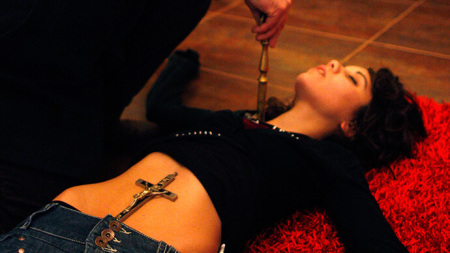Temptation is more dangerous to the soul than demonic possession, exorcist says

Possession is not the "most common" or "dangerous" aspect of the demonic realm but temptation is, according to an exorcist ordained and trained by the Catholic Church.
When many consider demonic possession, images come to mind from films such as "The Exorcist" and other examples from popular culture. Yet, the greater way the devil works is through temptation to commit evil, said Father Francois Dermine, a priest who has been an exorcist for more than 25 years, in a recent interview with Catholic News Agency.
“The most common manifestation of the demonic is temptation, which is much more significant than possession,” Dermine said.
“We must not undervalue the significance of temptation. It’s not as spectacular as possession, but it’s far more dangerous [to the soul],” he added.
The Dominican priest cautioned against thinking that every physical ailment is rooted in demonic oppression since most cases can be attributed to natural causes.
“When a person comes and asks for a blessing for a specific problem, the first thing an exorcist must ask is, did you see the doctor?” the priest said.
Dermine is a French Canadian and presently serves in the Italian archdiocese of Ancona-Osimo. He believes that it's a mistake to confuse preternatural phenomena like demonic activity with supernatural charisms, which come from God.
“It’s a very important difference,” he said. “We have a human nature and cannot know things without learning through our senses.”
“God created us to operate in a certain way. If you have extra-sensorial perceptions, and things like this, and they are not meant to help or to provoke a spiritual result, then they cannot come from God.”
The ministry of deliverance from demonic spirits is not specifically listed as one of the spiritual graces in the New Testament in the same way that gifts of healing, discernment of spirits, tongues, and the interpretation of those tongues are, in passages like 1 Corinthians 12 and 14.
Jesus' earthly ministry consisted of driving out unclean spirits on several occasions and at times His disciples were known to do so as well. In the Gospel of Mark 9, Jesus ministered to a boy who would be seized by a demonic spirit and thrown to the ground. When the disciples could not cast the spirit out, He told them: "This kind can come out only by prayer."
In Acts 5, it is recorded that the apostles healed many who were sick and tormented by demons.
Some evangelicals stress the importance of distinguishing between possession and oppression, arguing that it's impossible for a sincere believer in Jesus Christ to be possessed by a demonic spirit because possession implies ownership.
"While believers will engage in spiritual warfare and will be oppressed, they cannot be possessed by the demonic forces," the position papers on spiritual warfare for the Assemblies of God denomination note.
"Great care must be taken not to confuse emotional and mental illnesses with demonic activity. While the demonic activity may mimic the behavior exhibited in mental illness, to assert that they are the same can bring harm to individuals, preventing them from receiving the medical care needed. The wise counsel of godly doctors, counselors, and psychologists can be of assistance in discerning the actual condition. The powerful and all-wise Holy Spirit provides discernment and wisdom to those who minister to humans facing this severe challenge," it reads.
Earlier this year, the Roman Catholic Church opened up its exorcism courses to all major Christian denominations amid increased demand for deliverance ministers.
“Expelling the devil goes back to the earliest origins of the Christian Church,” said Father Pedro Barrajon, one of the organizers of the 14th edition of the “Course on Exorcism and Prayer of Liberation,” in an interview with The Telegraph back in May.
“The Catholic rite is very structured, whereas some of the other churches are more creative, they don't use a precise format.”





















